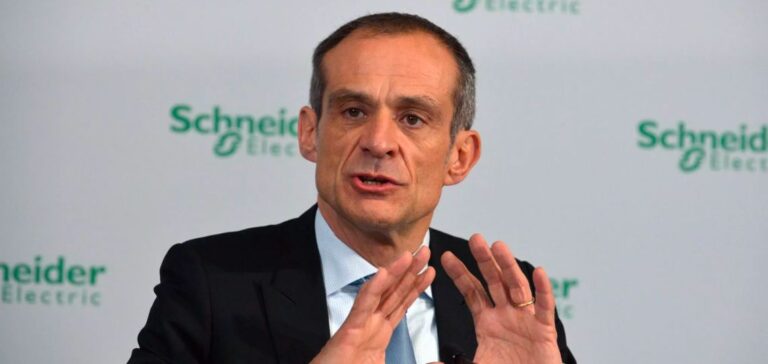Turn down the heat? Turn off the electricity? The management of energy, whether forced by rationing, or voluntary to fight against global warming, “makes money”, provided that there is a “collective organization”, says the CEO of the Schneider Electric group, Jean-Pascal Tricoire, in an interview with AFP.
As France fears cold weather this winter and Emmanuel Macron presides over a Defense Council on Friday dedicated to the country’s energy supply, the electrical equipment group’s chairman believes the situation can lead to “savings” and, above all, to “better sharing of electricity.”
On his Twitter profile, Mr. Tricoire displays the word “efficiency” in green letters. At the end of June, he had welcomed the call for sobriety launched jointly by the three major energy bosses in France, the CEO of TotalEnergies, the CEO of EDF and the CEO of Engie.
To solve the problem of peak consumption hours, which are causing fears of blackouts this winter, we “must be able to organize ourselves collectively,” he says.
For example, voluntary reductions in consumption by some should allow others to continue using electricity. Schneider, a group with sales of 16 billion euros in the first half of the year, tested an “erasure” in one of its factories in April: the factory stopped heating and charging its cars for two hours.
We had been warned three days before by the “energy weather forecast”, the Ecowatt system (managed by RTE, the French electricity transmission network, editor’s note). That day, we started the heating at 08:00 instead of 06:00: we saved 850 kWh”, says Mr. Tricoire.
“You have to be organized, and it was easy to do because we are equipped with building management systems.” These systems, a kind of computer brain that manages a building’s energy consumption, are a specialty of the French group, which is counting on the current energy debate to accelerate its sales.
“It’s going to move very fast”
“France is a very tertiary country and has a lot of offices,” said Tricoire, regretting that “only 6% of buildings” are equipped with such systems. According to him, on average, “an office building consumes about 300 kWh per square meter per year, whereas it consumes only 180″ with such equipment.
For the habitat, taking the example of Australia or California, he estimates that in the long term, “a normal house” will be “very largely self-supplied” with electricity, “enough to erase many +creeps” and enough to participate in the resolution” of the problems of supply as well as climate, he judges.
“Every roof of a house should have a production component, if we look ahead five or ten years”: “and we should all know what is happening at home in terms of energy directly on our laptop: for example, if the freezer is unplugged I should know it, I should know how much my car consumes, and how much it costs me”, he says.
According to him, consumers who are connected and informed of their consumption in real time are lowering it de facto.
Mr. Tricoire describes an all-electric landscape in France where “a large part of the production will be local”, whether “at the individual or collective level”.
“I think it’s going to move very fast,” he says, citing as a driver of change “the convergence of renewable energy” in full development, “technological advances on the storage” of electricity and “the explosion of electric mobility.” “All this is catalyzed by the climate emergency and unfortunately accelerated by the emergency of the energy transition due to the war in Europe” he notes.
However, it does not aim to fragment the electricity landscape, which is dominated by EDF in France. Enedis, subsidiary of EDF and manager of the current distribution network, “will remain” according to him “the great administrator of the complexity of the electric network”.
“On the other hand, for everyone who can, we all want to be part of solving both the climate problem and the energy problem.”





















